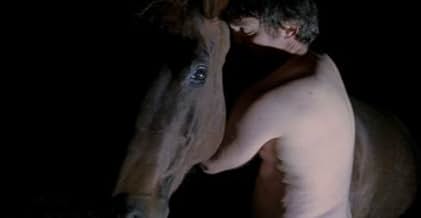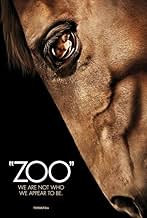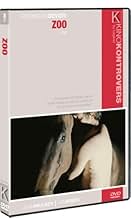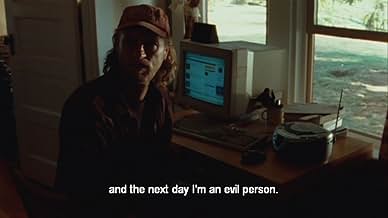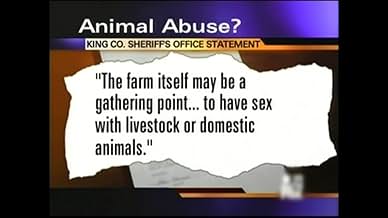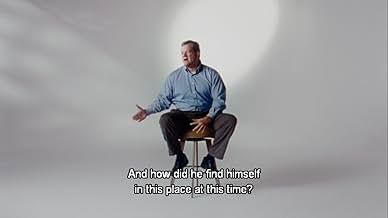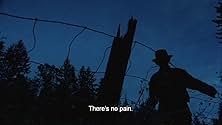IMDb रेटिंग
5.5/10
3.1 हज़ार
आपकी रेटिंग
अपनी भाषा में प्लॉट जोड़ेंA look at the life of an Enumclaw, Washington man who died as a result of an unusual encounter with a horse.A look at the life of an Enumclaw, Washington man who died as a result of an unusual encounter with a horse.A look at the life of an Enumclaw, Washington man who died as a result of an unusual encounter with a horse.
- पुरस्कार
- 1 जीत और कुल 5 नामांकन
Forest Fousel
- Capitol Hill Man
- (as Forest L. Fousel)
Andrew Scott McIntyre
- Military Man
- (as Andrew McIntyre)
Michael J. Minard
- Cop #1
- (as Michael Minard)
फ़ीचर्ड समीक्षाएं
Zoo is probably as tasteful a movie as can be, given its bestial subject. For those of you who aren't aware, there's a small population of the world who prefer the love of an animal--both mentally and physically--over the love of a human. This film stylistically recreates the life and death of one horse lover, Mr. Hands, and his pack of animal molesting friends, during one of many meetings and BBQ's in a small town near Seattle. Mr. Hands died from internal injuries, caused by the numerous and repetitive thrusting of the enlarged member of a stallion into his anus.
The film is tasteful because it's not sleazy. In this respect, it's almost worse on the audience because it humanizes these so-called animal lovers. What you'd think would be more like a shockumentary, more than anything else, really becomes a shallow dissection of a zoophile's playful mind. It's certainly not psychological, nor really in-depth; but its shallowness really makes it that much more grim.
As I watched the film, I felt like a voyeur peering into the lives of ordinary human beings doing absolutely bizarre and reprehensible things--and they just talked about it as if it were as benign and workaday as eating a bowl of cereal or taking the dog for a ride (insert pun here). Yet, much like a pedophile talking about his love for children, these zoophile's innocently and sincerely spoke about their love for animals.
Initially concerned about the content of the film, I left the theater without witnessing the exploitation or mockery of bestiality, nor did I see anything graphic or overtly sexual. I did leave the theater a little sickened, however, because I didn't loathe Mr. Hands or his friends. In fact, I somehow sympathized with their pitiful plight.
The film is tasteful because it's not sleazy. In this respect, it's almost worse on the audience because it humanizes these so-called animal lovers. What you'd think would be more like a shockumentary, more than anything else, really becomes a shallow dissection of a zoophile's playful mind. It's certainly not psychological, nor really in-depth; but its shallowness really makes it that much more grim.
As I watched the film, I felt like a voyeur peering into the lives of ordinary human beings doing absolutely bizarre and reprehensible things--and they just talked about it as if it were as benign and workaday as eating a bowl of cereal or taking the dog for a ride (insert pun here). Yet, much like a pedophile talking about his love for children, these zoophile's innocently and sincerely spoke about their love for animals.
Initially concerned about the content of the film, I left the theater without witnessing the exploitation or mockery of bestiality, nor did I see anything graphic or overtly sexual. I did leave the theater a little sickened, however, because I didn't loathe Mr. Hands or his friends. In fact, I somehow sympathized with their pitiful plight.
OK. Yeah, we all know what it's about. Get over it.
Are you done? Good. Now sit down and watch this film.
"ZOO" is a groundbreaking film not simply because of its taboo subject matter, but how it weaves said subject matter into this visceral experience WITHOUT EVER SHOWING YOU A SINGLE SHOCKING THING! Watching this film was like experiencing something born from a love triangle consisting of Werner Herzog, Errol Morris and David Lynch.
And the music... Aah! The music was perfect!
"ZOO" is exactly the kind of progressive film making we as the paying public should be embracing.
Are you done? Good. Now sit down and watch this film.
"ZOO" is a groundbreaking film not simply because of its taboo subject matter, but how it weaves said subject matter into this visceral experience WITHOUT EVER SHOWING YOU A SINGLE SHOCKING THING! Watching this film was like experiencing something born from a love triangle consisting of Werner Herzog, Errol Morris and David Lynch.
And the music... Aah! The music was perfect!
"ZOO" is exactly the kind of progressive film making we as the paying public should be embracing.
Actors silently recreate controversial true-life events which took place in Washington State near Puget Sound when a family man died a shameful, incomprehensible death: he successfully managed to get a horse to have sex with him, resulting in internal injuries. Called zoophilia, this act of sexually bonding with an animal not of the human variety is the basis for this entire production and yet is tiptoed around in a most facetious, irritating, and finally dreary manner. The audio interviews with actual persons connected to this story fail to flesh out the narrative, what with clueless lines such as: "These were animals I loved. I wasn't breaking any laws." True, at that time, Washington did not have laws on the books regarding bestiality (which has since been rectified), but we are never made to understand this obsession. This "classless society" of men is envisioned here as members of a secretive sect (mysteriously filmed), and what we hear on the soundtrack are the murmurings of troubled and regretful lost souls. The swooping, gliding cinematography is handsome, but only serves to make the overall effect rather drowsy. The subject matter, though wanly dissected, isn't for the faint of heart...but if you're going to do a documentary-styled take on a small circle of zoophiliacs, you might want to figure out in advance what point you want to make. Director and co-writer Robinson Devor obviously didn't want to venture too far out into unchartered cinematic waters, yet his hesitance is much more of a turn-off than his theme. *1/2 from ****
Based on the case of a Boeing employee who died from a perforated colon while being anally penetrated by a horse in Enumclaw, a town in rural Washington state, "Zoo" (the term is short for zoophilia, the sexual love of animals) is a brave attempt to address a highly controversial and polarising issue in a dispassionate way that neither condemns nor sympathises with the people involved in bestiality. The film recreates the events leading up to the man's death and its aftermath in a way that's part documentary / part drama with re-enactments of scenes and emphasising a soft, dream-like mood with delicately muted, wafting music. Director Devor uses four narrators, talking to an unseen listener, to retell the events from the point of view of the people who knew the man, referred to in the film as "Mr Hands", and this approach thrusts (um) the viewer right into the twilight world of zoophiles: how they found each other through Internet contacts, how they organised their tryst and their reactions when the man was injured and when their secret activities became known to the outside world.
The film has the air of a noir mystery: the majority of scenes are filmed in shadow, at night or in dark colours with blue being predominant. The story unfolds slowly and elliptically and anyone who is unaware in advance as to what the film is about may be puzzled at the indirect way "Zoo" tiptoes around the subject until near half-way when a news report drops its headline in deadpan style. The pace is very steady, perhaps too steady and slow, and the film often dwells on several still camera shots which look deliberately staged as if for static display purposes. Close-ups and landscapes often look very abstract with washes of blue across a background; an orchard looks like a misty fairyland beneath a light coating of rain. The mood is even and quite blank until a scene in which police investigators viewing a DVD recording appears; the police react with horror and shock watching the act of buggery and only then do viewers feel something creepy crawl up their spines.
For all its delicacy, "Zoo" gives the impression of something much bigger than its subject matter struggling to make itself seen and heard: the zoophiles give the impression of wanting companionship, a sense of belonging, a need to share something special that gives meaning to their lives, and thinking they have found it. They seek a utopia in which everyone is equal and no-one is judged by how much money s/he earns or how educated s/he is. The places in rural Washington where many of them live look impoverished and some zoophiles may well be drifters or marginalised people barely managing to make a living and survive. (Difficult to tell as many scenes are recreations of actual events with actors playing the zoophiles.) If the film had directly addressed the need of the zoophiles for meaning, for companionship, it might have been able to gain more co-operation from the people involved; as it is, the level of co-operation it got is very restricted. The dead man's family refused to be interviewed for the film which is a pity as the wife and child might have presented him as more well-rounded than he appears in "Zoo".
The film also suffers from subjectivity and could have done with a more objective view of its subject. Interviews with psychologists and psychiatrists on zoophilia and perhaps other conditions such as lycanthropy (identifying oneself as an animal rather than as a human) might have shed light on why some people are sexually attracted to animals and to some kinds of animals in particular. The goals of the project would still be met: the issue would not be sensationalised and viewers might come away with a greater understanding of zoophilia and other bizarre philias. Instead the film can only concentrate on the horse-trainer, Jenny Edwards, who took charge of the horses after the incident became public: she admits that after having followed the case in its detail and ordering one of the horses gelded, that she's "on the edge" of understanding the zoophiles' obsession. It appears also that the director and film-crew were as much in the dark as Edwards was while making the film; even after its completion, the film-makers still were scratching their heads trying to make sense of what they'd done. Not a good portent for a film.
Yes, zoophilia is a difficult subject to talk about, let alone film, without making it look disgusting, degraded or ridiculous and pathetic. "Zoo" tries hard not to take one side or the other but with a subject like this, the attempt to be "balanced" is a tough act indeed to pull off. Some viewers will be irate that the film advocates no position at all, as if it's the film-makers' duty to tell them what they must believe. I think though that to achieve the "balance" that "Zoo" strives for, the film-makers should have pulled back from their subjects and taken a more generalised view of the issue of zoophilia; the police officers, the courts, psychologists and medical who dealt with the dead man and his friends should have been consulted for their opinions about zoophilia.
The film has the air of a noir mystery: the majority of scenes are filmed in shadow, at night or in dark colours with blue being predominant. The story unfolds slowly and elliptically and anyone who is unaware in advance as to what the film is about may be puzzled at the indirect way "Zoo" tiptoes around the subject until near half-way when a news report drops its headline in deadpan style. The pace is very steady, perhaps too steady and slow, and the film often dwells on several still camera shots which look deliberately staged as if for static display purposes. Close-ups and landscapes often look very abstract with washes of blue across a background; an orchard looks like a misty fairyland beneath a light coating of rain. The mood is even and quite blank until a scene in which police investigators viewing a DVD recording appears; the police react with horror and shock watching the act of buggery and only then do viewers feel something creepy crawl up their spines.
For all its delicacy, "Zoo" gives the impression of something much bigger than its subject matter struggling to make itself seen and heard: the zoophiles give the impression of wanting companionship, a sense of belonging, a need to share something special that gives meaning to their lives, and thinking they have found it. They seek a utopia in which everyone is equal and no-one is judged by how much money s/he earns or how educated s/he is. The places in rural Washington where many of them live look impoverished and some zoophiles may well be drifters or marginalised people barely managing to make a living and survive. (Difficult to tell as many scenes are recreations of actual events with actors playing the zoophiles.) If the film had directly addressed the need of the zoophiles for meaning, for companionship, it might have been able to gain more co-operation from the people involved; as it is, the level of co-operation it got is very restricted. The dead man's family refused to be interviewed for the film which is a pity as the wife and child might have presented him as more well-rounded than he appears in "Zoo".
The film also suffers from subjectivity and could have done with a more objective view of its subject. Interviews with psychologists and psychiatrists on zoophilia and perhaps other conditions such as lycanthropy (identifying oneself as an animal rather than as a human) might have shed light on why some people are sexually attracted to animals and to some kinds of animals in particular. The goals of the project would still be met: the issue would not be sensationalised and viewers might come away with a greater understanding of zoophilia and other bizarre philias. Instead the film can only concentrate on the horse-trainer, Jenny Edwards, who took charge of the horses after the incident became public: she admits that after having followed the case in its detail and ordering one of the horses gelded, that she's "on the edge" of understanding the zoophiles' obsession. It appears also that the director and film-crew were as much in the dark as Edwards was while making the film; even after its completion, the film-makers still were scratching their heads trying to make sense of what they'd done. Not a good portent for a film.
Yes, zoophilia is a difficult subject to talk about, let alone film, without making it look disgusting, degraded or ridiculous and pathetic. "Zoo" tries hard not to take one side or the other but with a subject like this, the attempt to be "balanced" is a tough act indeed to pull off. Some viewers will be irate that the film advocates no position at all, as if it's the film-makers' duty to tell them what they must believe. I think though that to achieve the "balance" that "Zoo" strives for, the film-makers should have pulled back from their subjects and taken a more generalised view of the issue of zoophilia; the police officers, the courts, psychologists and medical who dealt with the dead man and his friends should have been consulted for their opinions about zoophilia.
I appreciate that the filmmaker is going for more than shock, but I'm not sure what this film really has to offer. It's clear that the filmmaker has some sympathy for the zoophiles, but as a whole, the film is mess. It's beautifully filmed. Almost every frame is mesmerizing, but it feels distracting rather than enlightening. The impeccably filmed images work to mask a lack of insight. Not a terrible film, but the novelty of the subject matter will bring it more attention than it ultimately deserves. It's also derivative. It borrows heavily from Errol Morris. It's probably better than most stuff out there now. At least I saw it instead of Georgia Rule.
क्या आपको पता है
- ट्रिवियाThe horse performer in this movie was a Thoroughbred mare named 'Somebodys Baby', and is a former successful racehorse. The horse in the incident portrayed was in reality an Arabian stallion.
- कनेक्शनFeatured in Aristokraticheskiy kinematograf: एपिसोड #1.9 (2011)
टॉप पसंद
रेटिंग देने के लिए साइन-इन करें और वैयक्तिकृत सुझावों के लिए वॉचलिस्ट करें
- How long is Zoo?Alexa द्वारा संचालित
विवरण
बॉक्स ऑफ़िस
- US और कनाडा में सकल
- $69,770
- US और कनाडा में पहले सप्ताह में कुल कमाई
- $7,811
- 29 अप्रैल 2007
- दुनिया भर में सकल
- $69,770
- चलने की अवधि1 घंटा 15 मिनट
- रंग
- पक्ष अनुपात
- 1.78 : 1
इस पेज में योगदान दें
किसी बदलाव का सुझाव दें या अनुपलब्ध कॉन्टेंट जोड़ें



